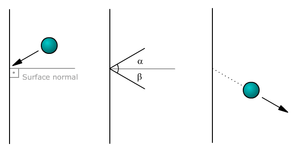Deflection (physics)

A deflection, in physics, refers to the change in an objects' acceleration as a consequence of contact (collision) with a surface or the influence of a field. Examples of the former include a ball bouncing off the ground or a bat; examples of the latter include a beam of electrons used to produce a picture, or the relativistic bending of light due to gravity.
An object's deflective efficiency can never equal or surpass 100%. For example, a mirror will never reflect exactly the same amount of light cast upon it. Also, on hitting the ground, a ball previously in free-fall (meaning no force other than gravity acted upon it) will never bounce back up to the place where it first started to descend. This is a consequence of thermodynamics, where, for every action, some energy gets converted into alternative forms of energy or is absorbed by the deformation of the objects involved in the collision..